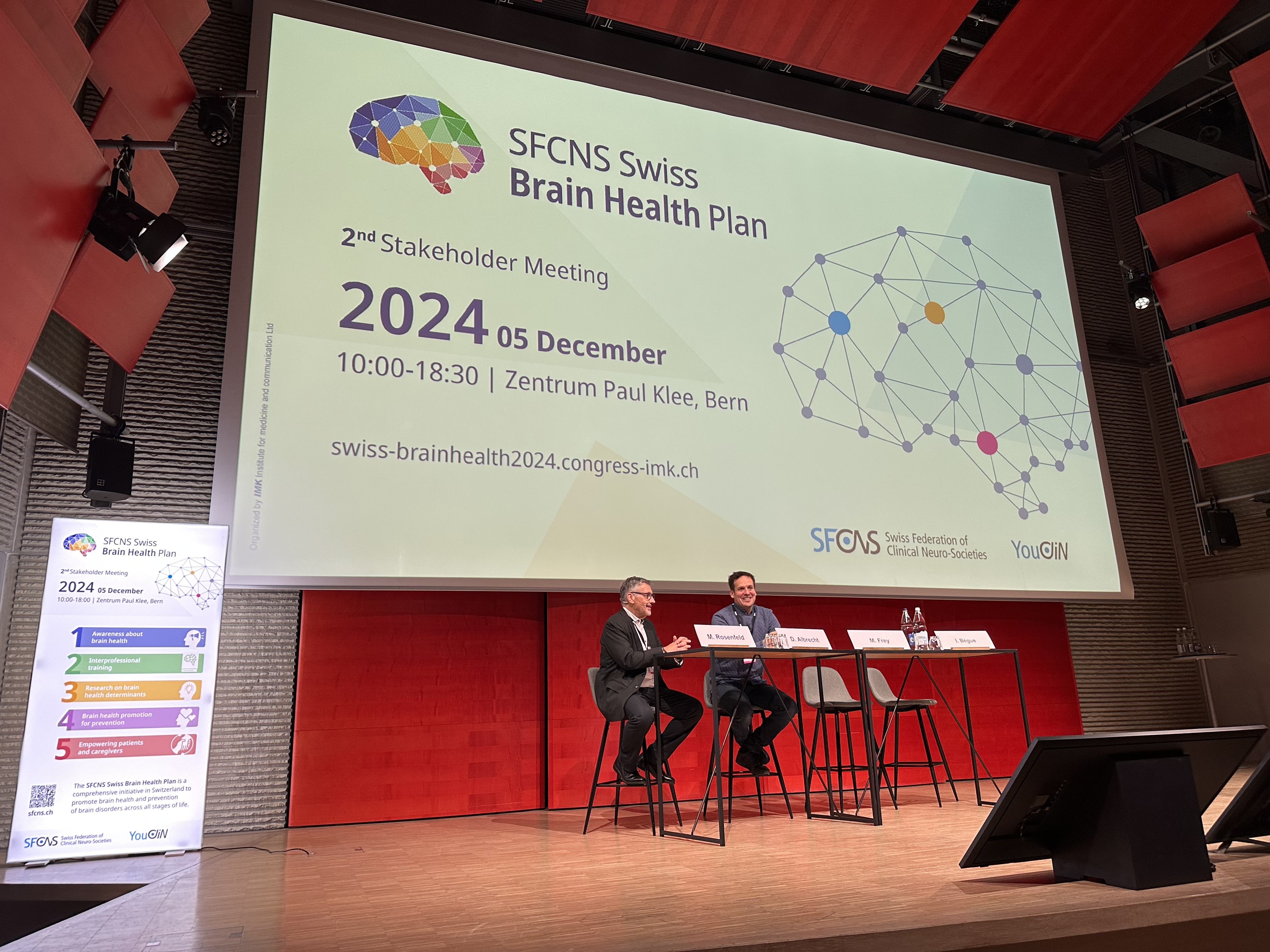Successful SFCNS Swiss Brain Health Plan 2nd Stakeholder Meeting
Strong collaboration to promote brain health
The goal of the Swiss Brain Health Plan (SBHP) is to implement the Swiss Brain Health Strategy, to raise awareness about brain health and to initiate prevention programs.
On Thursday, 5 December 2024, representatives from neurology, psychiatry, health economics, public health and patient organizations met at the SFCNS Swiss Brain Health Plan- 2nd Stakeholder Meeting to discuss the aims and the development of a national brain health strategy. International guests enriched the event with valuable insights and placed the efforts in a global context.
Prof. Claudio Bassetti, MD, (Chair, Swiss Brain Health Plan) opened the event together with Pierre Alain Schnegg (Member of the Bernese Government and Director of Health) and Petra Baeriswyl, Head of the Prevention of Non-Communicable Diseases Division at the FOPH.
Session I
Roadmap of the Swiss Brain Health Plan: Broad-based - The five pillars
At the beginning of the program, the Swiss Brain Health Committee presented the roadmap of the project and explained the different fields of action:
1. creating awareness of brain diseases and preventive measures
2. promote interprofessional training
3. research on brain health determinants
4. brain health promotion and prevention
5. empowerment of patients, relatives and caregivers
Very specific projects were also presented as part of these presentations, such as the prevention projects migraine friendly workspace and migraine friendly school.
Session II: Patient's voice
The second part of the program focused on those affected. Among others, Daniel Albrecht, world champion in ski racing, reported on his experiences following his serious accident in which he suffered a severe traumatic brain injury in 2009. The interview with personal insight was conducted by Martin D. Rosenfeld (FRAGILE Suisse - patient organization for people with brain injury and their relatives).
Session III and IV: National and International Roundtable
Kathrin Huber (Secretary General GDK), Prof. Claudio Bassetti, MD, (Chair, Swiss Brain Health Plan), Prof. Matthias Peter (Swiss National Science Foundation (SNSF), Petra Baeriswyl (Head of the Department for the Prevention of Noncommunicable Diseases at the FOPH) and Christine Bulliard-Marbach (National Councillor Fribourg) discussed the importance of a Swiss brain health strategy, what should be taken into account and how politicians should best proceed together with the other stakeholders in order to realize the goal of a coordinated and efficient Swiss Brain Health Plan as soon as possible. The panel discussion was moderated by Prof. Thomas Zeltner, MD, (President SRK).
In a second roundtable, we heard from representatives of other national brain health initiatives about how they are organized, what they focus on, what they have already achieved and what their future goals are. Prof. Thomas Mokrush, MD, represented the German Brain Council, Silja Nicoline Angellsen the Norwegian Health Strategy, Prof. Alfred K. Njamnshi, MD, the Brain Research Africa Initiative, Prof. Christopher Chen, MD, the Brain Health Initiative from Singapore and Prof. Riaz Khan, MD, that of the United Arab Emirates.
Session V: Societal transitions
The last session of the conference showed how strongly brain health is linked to social developments and how they influence each other. For example, we learned what digitalization, with all its positive and negative developments, has brought about for the benefit and detriment of brain health. Other contributions dealt with the term brain capital and what is meant by it, what influence the parental brain has on the well-being of the child and how research is positioned in this diverse field.
The event was a great success and clearly demonstrated the importance of the exchange between the various stakeholders. Only if all perspectives are included and problems and solutions are considered from different angles, the goal of a national brain health strategy can be implemented sustainably.
We would like to thank all speakers and discussants for their valuable contributions, the participants for their interest and all sponsors, organizers and all other parties involved for their great commitment.
